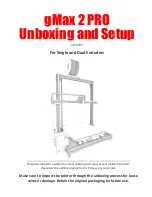
Printer Flood Fill Versus Job Data
White ink can be printed using flood fill data generated by the printer or job data. A
printer flood fill cover the whole image area while spot data is assigned in specific areas.
Job data is separated by the ONYX software into six data planes: C, M, Y, K, Spot 1, and
Spot 2. The white ink channel is usually configured to print using the Spot 1 or Spot 2
data plane but can also be printed using the C,M,Y or K data plane.
White Ink Workflow Data Preparation
White ink print job output can be accomplished in a variety of ways depending on the
desired results and preferred working process. There are three primary methods and they
can be used either independently or all at the same time. The workflow options are:
Printer Flood Fill Layer Configuration,
ONYX software Spot Layer Tool, and
White Spot Data Image Preparation.
Printer Flood Fill Layer Configuration
in an Onyx Media Model does not require any
pre-rip file preparation and is the easiest method of achieving white ink output. All that
is required is to set up the Layer Configuration to include a printer flood layer. The
printer flood layer encompasses the bounding box (the outer border of the image) of the
file being processed. There is also an option to control the amount of flood by choosing
the drop level. The higher the drop level number the greater the amount of white ink.
ONYX Software Spot Layer Tool
offers many options to process an image, and thus
allows various possible configuration choices. You can save these configurations as Filters
and place them in a Quick Set and this makes it possible to re-create with minimal effort
settings that are often used. All work with the Spot Layer tool requires a media with two
spot layers enabled in the layer options in order for it to work as expected.
White Spot Data Image Preparation
requires that the white data be prepared in image
editing programs such as Adobe Illustrator®, InDesign, or PhotoShop®. You must use
specific naming conventions and image use protocols in order for the Onyx RIP-Queue
software to process the data as desired. This method may be the best choice if the desired
white ink spot data includes complicated selections or if data is being created for outsourc-
ing. A reasonable level of proficiency in these programs is recommended to use this
technique.
All of these methods can also be used either alone or in conjunction with each other to
create the desired output results. For example, you may generate the spot layer information
for parts of an image in PhotoShop and then go on to specify a Flood Layer Configuration
in Production House. This can result in a Flood Layer and a Spot Layer followed by a
CMYK Layer. The spot data and the flood will occupy two layers of white density and
the CMYK image data can occupy the third layer. You can determine the print order of
these layers in ProductionHouse or THRIVE.
Chapter 9 - How to Work With White Ink and Varnish
145
White Ink Workflow Overview
Summary of Contents for Arizona 400 Series GT
Page 1: ...Oc Arizona 400 Series GT Oc Arizona 440 460 480 GT XT Revision A Oc User Manual...
Page 6: ...6 Contents...
Page 7: ...Chapter 1 Introduction...
Page 14: ...Chapter 1 Introduction 14 Product Compliance...
Page 15: ...Chapter 2 Product Overview...
Page 18: ...Chapter 2 Product Overview 18 Printer Specifications...
Page 19: ...Chapter 3 Safety Information...
Page 41: ...Chapter 4 How to Navigate the User Interface...
Page 71: ...Chapter 5 How to Operate Your Oc Arizona Printer...
Page 97: ...Chapter 6 How to Operate the Oc Arizona 400 Series XT...
Page 104: ...Chapter 6 How to Operate the Oc Arizona 400 Series XT 104 How to Print With Dual Origins...
Page 105: ...Chapter 7 How to Operate the Roll Media Option...
Page 136: ...Chapter 7 How to Operate the Roll Media Option 136 How to Use Media Edge Protectors...
Page 137: ...Chapter 8 How to Use the Static Suppression Upgrade Kit...
Page 141: ...Chapter 9 How to Work With White Ink and Varnish...
Page 198: ...Chapter 9 How to Work With White Ink and Varnish 198 How to Create and Use Quick Sets...
Page 199: ...Chapter 10 Ink System Management...
Page 206: ...Chapter 10 Ink System Management 206 How to Change Ink Bags...
Page 207: ...Chapter 11 Error Handling and Trou bleshooting...
Page 211: ...Chapter 12 Printer Maintenance...
Page 265: ...Appendix A Application Information...
















































